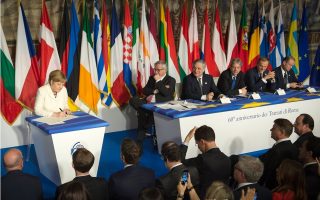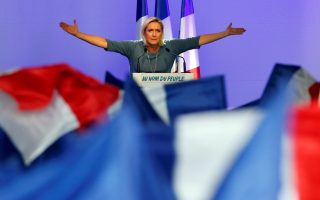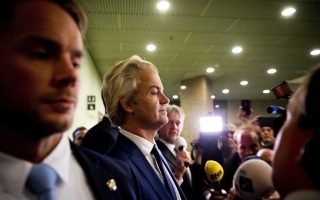The three ladies of Europe

The leaders of the European Union came together last Saturday on the Capitoline Hill to celebrate the 60th anniversary of the Treaty of Rome in what was a symbolic display of unity at a time that can only be described as complicated. The meeting also produced the usual declaration of common values and goals, a text of compromise that as such was lacking in any real content and was aimed at making everybody happy. Even Greek Prime Minister Alexis Tsipras found certain parts pleasing from a social point of view, though they were the same commitments made in the Treaty of Lisbon in 2007.
German Chancellor Angela Merkel was indisputably the dominant force in the proceedings, as other leaders appeared like – willing or unwilling – satellites around her. Merkel has the great quality of discretion in the way she exercises her role and even though she is the first woman to have been elected to the highest post in Germany, she has never played the valkyrie.
This image of symbolic and fragile unity was shattered on Wednesday when British Prime Minister Theresa May officially launched the process of the United Kingdom’s departure from the European Union, filing for divorce after an uncomfortable marriage of 44 years.
In contrast to Germany, Britain has a long history of strong women in power, starting with Queen Elizabeth I, then Queen Victoria in the empire’s heyday, and now Queen Elizabeth II. And to prove that such accession is not exclusive to the ranks of nobility, the daughter of a humble grocer, Margaret Thatcher, was the most emblematic prime minister Britain has had since the end of World War II.
May appeared affable yet determined in the manner in which she communicated her country’s bid when she spoke on the telephone to the true pillars of the EU, the leaders of Germany and France, and the president of the European Commission. It would be a terrible mistake to misinterpret her attitude as a sign of weakness. Britain is the second biggest economy in Europe after Germany and it will be a while before the City moves to Frankfurt. As for those who want to see the UK punished for its decision, May made sure – discreetly as always – to link the negotiations with the matter of European security.
The third lady of Europe – though some readers will certainly be startled when they hear her name – is Marine Le Pen, self-appointed contender for the leadership of the rebels who, she believes, are fighting against the “Vichy establishment” that has prevailed in France over the past few years. History really does play odd games.
Misogynists may brush these ladies off as playing games. If they are, then they are doing well because the men dropped the ball years ago. If there is one thing we can be certain of, it is that there is never a dull moment with these three ladies.





